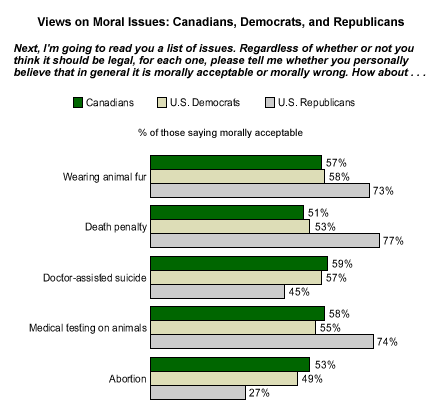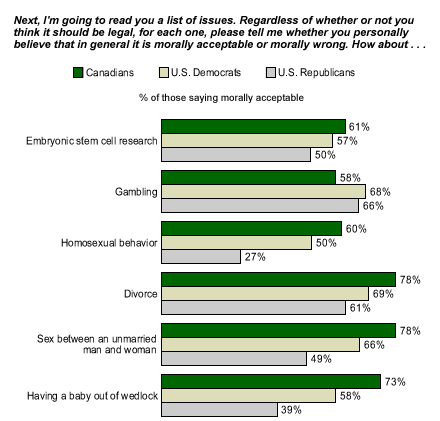After President George W. Bush's re-election, the jokes that abounded about U.S. Democrats fleeing their homeland to join their more liberal-minded neighbors in Canada were just another indicator of the election's contentiousness. But some Americans may seriously be considering the prospect. The Seattle Post-Intelligencer reported that Canada's immigration Web site received more than 180,000 visitors -- more than six times the normal number -- the day after Election Day.
A Dec. 6 article in the Vancouver Sun included interviews with several Americans from the Pacific Northwest who recently attended a weekend seminar on immigration to Canada. Many of the seminar attendees cited social and moral issues, such as gay marriage bans in the United States (the Canadian Supreme Court last week declared same-sex marriages constitutional) and the increased influence of the religious right, as their primary motivations for wanting to move.
When it comes to key social issues, would U.S. Democrats really feel more at home with the Canadian populace than with their non-Democratic countrymen? While a mass exodus of Americans to Canada is unlikely, recent Gallup polling in Canada and the United States shows that, with a few exceptions, U.S. Democrats* are closer to Canadians in their views on many moral issues than to non-Democrats in their own country. With a few exceptions, Democrats' and Republicans' views radically diverge, while political independents' views tend to align with Democrats' views on most moral issues.
On such controversial topics as the death penalty, abortion, doctor-assisted suicide, and wearing animal fur, Canadians and Democrats tend to see eye to eye. On the death penalty for example, which is illegal in Canada but legal in most U.S. states, the views of Canadians and U.S. Democrats are almost identical. Fifty-one percent (51%) of Canadians and 53% of U.S. Democrats believe the death penalty is morally acceptable. In comparison, 77% of Republicans say it is morally acceptable, as do 68% of independents.
Opinion on abortion reflects this same like-mindedness between Canadians and U.S. Democrats. While about half of Canadians (53%) and Democrats (49%) consider abortion to be morally acceptable, 27% of Republicans and 45% of independents say it is morally acceptable.

On a few issues, U.S. Democrats are closer to Republicans and independents on the opinion spectrum than they are to Canadians. For example, on the moral acceptability of divorce and gambling, Americans' views are fairly consistent regardless of political leanings, and uniformly more conservative than those of Canadians.
And there are a number of issues on which U.S. Democrats aren't in lockstep with Canadians. Homosexual behavior is one such topic; a majority (60%) of Canadians view homosexual behavior as morally acceptable, while half (50%) of U.S. Democrats share that sentiment. Twenty-seven percent of Republicans and 48% of independents find homosexual behavior morally acceptable.
In the case of embryonic stem cell research, American Democrats' views fall a little more in-between Canadians' and non-Democrats'. Sixty-one percent of Canadians, 57% of Democrats, 50% of Republicans, and 55% of independents say embryonic stem cell research is morally acceptable.
And while Canadians are significantly more likely than U.S. Democrats to think having a baby out of wedlock is morally acceptable -- 73% compared with 58% -- Republicans are even less likely to approve, at 39%. Independents align more with Democrats, but slightly fewer find it morally acceptable.

Bottom Line
Gallup data have shown repeatedly that Canadians are far more liberal than Americans are on most moral issues. U.S. Democrats, who are generally the most liberal Americans, have similar views to Canadians on many of these issues. But on other issues, especially those concerning sexuality and marriage, Canadians are still more liberal than those who identify with the party occupying the liberal end of the U.S. political spectrum.
*Results in the United States are based on telephone interviews with 1,000 national adults, aged 18 and older, conducted May 2-4, 2004. For results based on the total sample of national adults, one can say with 95% confidence that the maximum margin of sampling error is ±3 percentage points. The survey was conducted by Gallup USA.
Results in Canada are based on telephone interviews with 1,005 national adults, aged 18 and older, conducted Aug. 30-Sept. 6, 2004. For results based on the total sample of national adults, one can say with 95% confidence that the maximum margin of sampling error is ±3 percentage points. The survey was conducted by Gallup Canada.